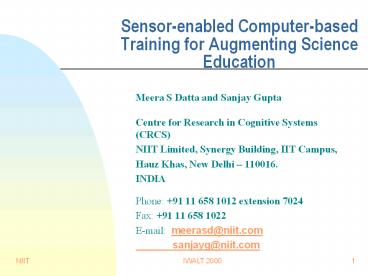Sensor-enabled Computer-based Training for Augmenting Science Education - PowerPoint PPT Presentation
1 / 23
Title:
Sensor-enabled Computer-based Training for Augmenting Science Education
Description:
Sensor-enabled Computer-based Training for Augmenting Science Education Meera S Datta and Sanjay Gupta Centre for Research in Cognitive Systems (CRCS) – PowerPoint PPT presentation
Number of Views:88
Avg rating:3.0/5.0
Title: Sensor-enabled Computer-based Training for Augmenting Science Education
1
Sensor-enabled Computer-based Training for
Augmenting Science Education
- Meera S Datta and Sanjay Gupta
- Centre for Research in Cognitive Systems (CRCS)
- NIIT Limited, Synergy Building, IIT Campus,
- Hauz Khas, New Delhi 110016.
- INDIA
- Phone 91 11 658 1012 extension 7024
- Fax 91 11 658 1022
- E-mail meerasd_at_niit.com
- sanjayg_at_niit.com
2
The Problem
The Problem The Solution Advantages Lesson
Design The Experiment Experimental
Data Learnings Future
- No seamless connection amongst
- Computer-Based Training Packages - access to only
theory - Data-logging units - no access to theory
- Lab equipment
3
The Solution
- Integrate lessons, data loggers and lab
equipment - Computer-Integrated Experimentation
4
Advantages
- Approach allows designing teaching units that
place the child in the role of a scientist - Eliminates delay between theory and practice
- Teaching unit takes on the role of a guide
- Enables topics to be introduced to a younger age
group
5
Lesson Design
6
The Experiment
- Student Spectrum
- 70 students
- 48 22
- 10 - 12 years
7
The Experiment
Kit
Lesson
Instrument
8
The Experiment
- Data Captured
- Time taken to complete experiments
- Help Sought
- No guidance/Guidance/Handholding
- Previous Experience Yes/No
- Observations/Remarks
9
The Experimental Data
Time taken by School A children
10
The Experimental Data
Time taken by School B children
11
The Experimental Data
Time taken versus previous experience
12
The Experimental Data
Time taken by School A and B (computer)
13
Learnings
- Performance does not seem be affected by
- background
- gender
- previous experience
- exposure to computers
- Transferred learning mass seems high
14
Learnings
- Quick creation of lessons possible
- Can be integrated with non-formal curricula
- Computer will have to be placed in the lab or
vice versa - New methodology for lesson design
15
Future
- Lessons designed by children/teachers
- New experiments conceived by children
- New instruments conceived by children
16
A screenshot of the Lesson
17
A Student with the Kit
18
Using the Booklet
19
Using the Booklet
20
Using the Booklet
21
Equilibrium Temperature
22
Good and Bad Conductors
23
Using MSAgents































